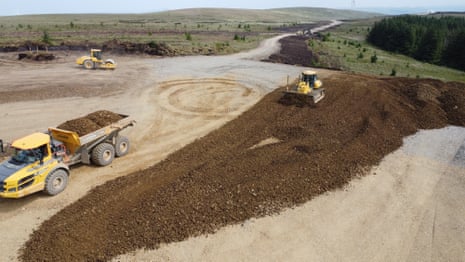Government's action to tackle the number of asylum seekers coming to UK important step to 'restoring order', says Yvette Cooper
The home secretary has said the government’s action to tackle the number of asylum seekers coming to the UK had been an important step to “restoring order”.
Responding to new immigration statistics, Yvette Cooper said Labour had overseen increased numbers of returns of asylum seekers not granted asylum and pointed to the reduced spending on asylum.
According to the PA news agency, Cooper said:
We inherited a broken immigration and asylum system that the previous government left in chaos. Since coming to office we have strengthened Britain’s visa and immigration controls, cut asylum costs and sharply increased enforcement and returns, as today’s figures show.
The action we have taken in the last 12 months – increasing returns of failed asylum seekers by over 30%, cutting asylum costs by 11%, reducing the backlog by 18% and our forthcoming plans to overhaul the failing asylum appeal system – are crucial steps to restoring order and putting an end to the chaotic use of asylum hotels that we inherited from the previous government.
At the same time, we are bringing legal migration back under control, with a 48% reduction in work visas this year – and further stronger visa controls and higher skill requirements introduced through our white paper expected to bring those overall numbers down further.
As we roll out further reforms, including the new pilot with France, new counter terror powers to strengthen border security and new asylum reforms later this year (including reforms to speed up the persistent delays in the appeals system), we will continue to take the serious steps required to restore order, control and fairness to the system, and to continue building the foundations of a new and stronger approach.
Figures published by the Home Office on Thursday showed that the number of quarterly enforced returns of people who do not have a right to stay in the UK rose slightly from 2,314 in January-March 2025 to 2,323 in April-June 2025.
A total of 9,072 enforced returns took place in the year to June, up 25% from 7,253 in the previous year and the highest figure for a 12-month period since the year to December 2018 (9,236).
The Home Office is responsible for returning people to their country of origin if they do not have a legal right to remain in the UK. There are three types of returns: enforced returns, which are carried out directly by the Home Office; voluntary returns, who are people who were facing deportation but left of their own accord, sometimes with support from the Home Office; and port returns, who are people refused entry to the UK and who have subsequently departed.
Key events Show key events only Please turn on JavaScript to use this feature
Ireland’s premier and deputy premier have welcomed clarity on the EU-US trade deal, which sees the US commit to capping tariffs on pharma goods at 15%.
Taoiseach Micheál Martin said the trade agreement represented a “significant win” for the EU while Tanaiste Simon Harris said it offered an “important shield” for Irish exporters. The EU struck a trade deal with the US on 27 July, five days before Donald Trump said a 30% tariff would kick in for the bloc.
The deal sees 15% tariffs on most EU goods including cars, semiconductors and pharmaceuticals entering the US. There are “zero for zero” tariffs on a number of products including aircrafts and aircraft parts, some agricultural goods and certain chemicals – as well as EU purchases of US energy worth $750bn over three years.
The PA news agency reports that in the aftermath of the deal, it was not clear whether 15% would remain the rate for the pharma sector or be increased. The EU-US statement published on Thursday said that as of 1 September, the US will apply a maximum tariff rate of 15% on generic pharmaceuticals, their ingredients and chemical precursors.
Angela Rayner hit with legal challenge over datacentre on green belt land

Robert Booth
The deputy prime minister, Angela Rayner, has been hit with a legal challenge after she overruled a local council to approve a hyperscale datacentre on green belt land by the M25 in Buckinghamshire.
Campaigners bringing the action are complaining that no environmental impact assessment was made for the 90MW datacentre, which was approved as part of the Labour government’s push to turn the UK into an AI powerhouse by trebling computing capacity to meet rising demand amid what it terms “a global race” as AI usage takes off.
The home counties datacentre is relatively small compared with one planned in north Lincolnshire that will have about 10 times the capacity, and is dwarfed by one planned by Meta’s Mark Zuckerberg in Louisiana, which will be more than 50 times larger as he seeks to achieve digital “superintelligence”.
But Foxglove, the tech equity campaign group bringing the legal challenge alongside the environmental charity Global Action Plan, said the energy demand could push up local electricity prices and said it was “baffling” that the government had not carried out an environmental assessment.
Oliver Hayes, the head of campaigns at Global Action Plan, said Rayner’s “lack of meaningful scrutiny” was a worrying signal as more datacentres were planned around the UK. “Are the societal benefits of chatbots and deepfakes really worth sacrificing progress towards a safe climate and dependable water supply?” he said. “The government must reconsider its rash decision or risk an embarrassing reality check in court.”
An ageing population, a funding squeeze and a recruitment crisis have taken England’s adult social care system to breaking point. In this episode of Politics Weekly UK, recorded and first published in March, John Harris visited Greater Manchester to find out what a day in the life of a care worker looked like and whether it was too late to save this vital service:
Stella Creasy and Richard Tice call for scrutiny over which EU laws UK ditches

Helena Horton
Stella Creasy and Richard Tice are pushing for Labour to allow a Brexit scrutiny committee to be formed in parliament, after the Guardian revealed environmental protections had been eroded since the UK left the EU.
The Labour and Reform UK MPs argue that there is no scrutiny or accountability over how Brexit is being implemented. Creasy, the MP for Walthamstow and chair of the Labour Movement for Europe, said the UK needed a “salvage operation” to clear up the environmental and regulatory havoc caused by Brexit.
The analysis by the Guardian and the Institute for European Environmental Policy (IEEP) has found that since Brexit the EU has brought forward 28 new, revised or upgraded pieces of environmental legislation that the UK has not adopted, and the UK has actively chosen to regress by changing four different pieces of legislation including on protected habitats, pesticides and fisheries.
Creasy said the prime minister, Keir Starmer, needed to move more quickly to repair relations with the EU and realign on environmental law.
“I am working with Richard Tice as well as other Brexit sceptics on restoring some sort of European scrutiny committee in parliament so we can decide if and when we want to diverge rather than it all being passive,” she said.
Creasy said:
We don’t have a body in parliament that knows both UK and EU law and can forge a way forward. This data from the Guardian and IEEP makes the case for having a scrutiny committee looking at if we diverge, and if we strengthen or weaken environmental protections. MPs aren’t scrutinising this at all at the moment; they don’t even know about what’s going on.
One major issue is the planning and infrastructure bill, which overrides the EU’s habitats directive and allows rare habitats such as chalk streams to be destroyed if developers pay a nature restoration levy to government.
Chris Hinchliff, the MP for North East Hertfordshire, had the Labour whip removed for proposing amendments to the bill, including one to protect chalk streams from harmful development.
Creasy said she supported Hinchliff and that the UK should not be regressing from EU law.
There has been an 80% drop in the number of visas granted for nurses over the past 12 months, according to Home Office figures.
For work-related visas, 182,553 visas were granted in the year to June, which represents a 36% drop on the previous year.
The government said the 80% fall in visas for nurses may be due to “the end of the centrally supported nurse international recruitment programme and changes in demand for international staff”.
The UK’s “broken” immigration system is spilling over into tensions in communities in Northern Ireland, a Stormont minister has said.
Education minister Paul Givan made the comments as unionist politicians have asked for further investigations into the legal planning status of hotels in the region housing asylum seekers.
Earlier this week Antrim and Newtownabbey Council said an enforcement investigation has begun into the legal planning status of the Chimney Corner Hotel in Co Antrim being used to house asylum seekers.
It comes after Epping Forest district council was granted a temporary injunction by the high court on Tuesday which blocks asylum seekers from being housed at the Bell hotel in the Essex town.
Unionist politicians have further raised concerns about the status of hotels within the Causeway Coast and Glens and Ards and North Down borough council areas.

Matthew Weaver
An asylum seeker staying at a hotel that has been the flashpoint for anti-migrant protests has described being called a “scumbag” and treated like a criminal by local people.
Dozens of residents of Epping’s Bell hotel face an uncertain future after a court ruled on Tuesday that it cannot be used to house asylum seekers because of a breach of planning rules.
The verdict came after weeks of violent protests outside the hotel by far-right activists sparked when an asylum seeker resident was charged with sexually assaulting a 14-year-old girl.
Khador Mohamed, 24, from Somalia, says residents were locked in their rooms during the protests. When they are allowed to venture outside they are insulted, he says. “People call you scumbags sometimes and they throw cans of soda at you.”
He adds: “I wasn’t expecting this in England. I thought it would be friendlier.”
Mohamed says local attitudes changed sharply after the charge against the resident. “Now we’re seen as criminals. Before that we were just normal people,” he said.
He claims one woman shielded her children behind her when she saw Mohamed on the street. “It was a painful thing to happen to me – now we’re seen as rapist, paedophiles and thieves,” he says.
He adds: “I am sorry for what happened, but there is nothing much I can do. We are not all the same.”
The government is adding an extra year, and an extra £45m, to its scheme in England to help people find work, writes the Guardian’s senior economics correspondent, Richard Partington.
You can read his feature on youth unemployment here:
Labour party more than doubled their donations in 2024 but spent a record £30m on fighting general election
Kiran Stacey
Labour more than doubled their donations in 2024, according to newly published figures, but still made a loss after spending a record amount on the general election campaign.
The party’s annual accounts for last year, which were published alongside those of every significant UK political party, show it managed to attract nearly £40m in donations last year, up from £16.5m in the previous year.

But the party’s huge election spending sapped it of money, leading to an overall deficit of £3.8m. The Electoral Commission has previously reported Labour spent a record £30m on fighting the general election – ahead of the Conservatives, who spent £24m.
The Tories’ accounts meanwhile paint a bleak picture for the party, with donations having fallen by around a fifth last year, unusually for an election year.
Reform in contrast saw their income rocket more than 800% as donations and membership fees flooded in. The party brought in £10.8mn in 2024, compared with £1.4mn in the previous year.

Julia Kollewe
The UK’s business activity posted its biggest growth in a year this month, led by a solid upturn in the service sector, according to a closely watched survey.
The ‘flash’ reading from the S&P Global PMI survey showed improvement across the private sector, despite employment remaining a weak spot, with companies cutting hiring for an eleventh month.
The headline index rose to 53.0 in August from 51.5 in July, indicating faster expansion in business activity.
Input cost inflation edged up to its highest since May.
Chris Williamson, chief business economist at S&P Global Market Intelligence, said:
The flash UK PMI survey for August indicated that the pace of economic growth has continued to accelerate over the summer after a sluggish spring, the rate of expansion now at a one-year high. The services sector has led the expansion, but manufacturing also showed further signs of stabilising.
He cautioned that order books show that demand remains “uneven and fragile”.
Companies report concerns over the impact of recent government policy changes, as well as unease emanating from broader geopolitical uncertainty. Goods exports are still falling especially sharply.
Payroll numbers also continue to be cut at an aggressive rate by historical standards as firms cite weak order books and concerns over rising staff costs due to the policies announced in the autumn budget, which also contributed to persistent inflation pressures.
While the rise in business activity signalled by the PMI alongside the uplift in inflation to 3.8% in July lower the chances of further rate cuts this year, more data are required to assess both the sustainability of robust economic growth as well as the stickiness of the upturn in price pressures. Among a divided Bank of England rate setting committee, the perceived need for any future rate cuts will be very much data dependent.
The SNP government has been accused of a “national scandal” after it was revealed that hundreds of NHS buildings are more than 70 years old, reports the PA news agency.
A Scottish Liberal Democrat freedom of information request to all of Scotland’s health boards found the NHS still relies on 597 buildings that were built seven decades ago. Scottish Lib Dem leader Alex Cole-Hamilton said:
These figures show that the Scottish NHS is still relying on hundreds of buildings which are almost as old as the health service itself. While there will be many old buildings which have undergone the appropriate modernisation, the scale of the NHS’s maintenance backlog suggests that many of them have not kept pace with where health boards would like them to be.
It is a national scandal that millions across the country are being treated in old and crumbling buildings that are no longer fit for purpose.
The findings show 121 of the buildings are located in the NHS Greater Glasgow and Clyde health board area, where there are also 210 buildings up to 50 years old. In NHS Lothian, 104 buildings are more than 70 years old, as are 97 in NHS Grampian and 93 in NHS Tayside. Across Scotland, there are also at least 18 buildings which are both more than 70 years old and require high-risk repairs.
In December, it was reported that NHS Scotland’s maintenance backlog was more than £1.3bn, reports the PA news agency.
In NHS Ayrshire and Arran, 30 buildings are more than 80 years old – predating the founding of the NHS in 1948. Cole-Hamilton said:
The SNP have constantly delayed and paused new building projects.
In budget negotiations, Liberal Democrats secured commitments to advance the new Edinburgh eye hospital, as well as replacements for the Belford hospital in Fort William and the Gilbert Bain in Shetland. But there are many more projects like these which have been neglected by the SNP for too long.
Making sure people can get swift access to local health care in safe buildings should be a top priority for every political party. That’s what you get with the Scottish Liberal Democrats. I don’t believe the SNP can say the same.
A Scottish government spokesperson said:
We are providing £139m additional investment this year in NHS infrastructure to increase core capital funding for boards and support priority improvements and replacements in Scotland’s NHS estate.
Historic real-terms cuts to our block grant from the UK government have put pressure on our capital budget, but despite this we have delivered various new healthcare facilities across the country. This includes new national treatment centres in Fife, Highland and at the Golden Jubilee, as well as new community hospitals in Aviemore and Skye.
We are already working with all health boards to develop a whole-system NHS infrastructure plan which will meet the needs of the NHS across the whole of Scotland, supporting continued safe operation of existing facilities and informing longer-term investment priorities.

Sally Weale
Pupils in England who were thought to have been among the worst affected by Covid have bounced back in their GCSE results with more achieving top grades despite the disruption of the pandemic.
There had been fears that this cohort, who were in the final year of primary when the pandemic hit in 2020, cancelling their key stage 2 tests and disrupting their transition to secondary school, would be severely impacted going forward in their education.
However, the results published on Thursday showed 23% of entries for English 16-year-olds were awarded grades 7 or above, up from 22.6% last year, with boys improving their performance, though a higher proportion of girls continue to achieve top grades overall.
For pupils in Northern Ireland, the proportion getting grades 7 and above rose by a full percentage point to 31.4%, while the percentage getting grades 4 or above went up to 63.8%.
In Wales, pupils getting the top three grades rose to 20.1%, up from 19.8% in 2024, and those getting a 4 or better edged up by 0.3 percentage points to 63.8% this year.
Jill Duffy, the chair of Joint Council for Qualifications board of directors and chief executive of the OCR exam board, paid tribute to pupils’ resilience:
Looking at these results, it is hard not to be impressed by students’ breadth of skills and knowledge.
These students have shown resilience and determination throughout their school years; they now have the chance to thrive in their next endeavours, whether that is in education, training or apprenticeships.
Responding to this morning’s immigration figures showing a rise over the past year in the number of asylum seekers housed in hotels, Liberal Democrat home affairs spokesperson Lisa Smart said:
The asylum backlog has been far too large for far too long.
The Conservatives trashed our immigration system and let numbers spiral. Now this Labour government is failing to get a grip on the crisis.
The government urgently needs to stop dangerous Channel crossings and speed up asylum processing to bring down the backlog and end hotel use once and for all.
Nigel Farage said the public is right to be angry with the government and their predecessors over the rise in asylum seekers being housed in hotels by the government, reports the PA news agency.
Responding today’s Home Office figures, the Reform UK leader said:
Under Labour we now have record numbers claiming asylum. The vast majority should never qualify and most will cost the taxpayer a huge sum of money.
Our streets are becoming more dangerous yet this disaster gets worse. The public are right to be very angry with both Labour and the Tories for what they have done to us.
The charity Safe Passage has described the government as “working to shut down family reunion even further” due to its new scheme from France, part of the recent “one in, one out” deal, excluding unaccompanied children.
Responding to today’s Home Office figures, Donna Covey, chief executive at Safe Passage said:
Over 5000 children have crossed the Channel in the year ending June 2025, over half of those children have had to make this dangerous journey alone.
We work with unaccompanied children in Northern France who are simply trying to reach family, often the only family they have left. But with the UK’s limited family reunion rules, and a long, arduous process, they often turn to smugglers, at risk of exploitation, to reach family in the UK.
This government says it’s aiming to stop Channel crossing yet it’s working to shut down family reunion even further, which will only push more refugee families into taking dangerous journeys to reunite in safety.
The new scheme from France, part of the recent ‘one in, one out’ deal, offers a limited pathway for a few refugees in France, but it excludes unaccompanied children. The government must urgently rectify this, so children who have fled war and persecution, and are alone without family to care for them, can reach protection in the UK safely.
The best way to save lives in the Channel, stop the smugglers trade and protect refugees is to open safe routes.
Government's action to tackle the number of asylum seekers coming to UK important step to 'restoring order', says Yvette Cooper
The home secretary has said the government’s action to tackle the number of asylum seekers coming to the UK had been an important step to “restoring order”.
Responding to new immigration statistics, Yvette Cooper said Labour had overseen increased numbers of returns of asylum seekers not granted asylum and pointed to the reduced spending on asylum.
According to the PA news agency, Cooper said:
We inherited a broken immigration and asylum system that the previous government left in chaos. Since coming to office we have strengthened Britain’s visa and immigration controls, cut asylum costs and sharply increased enforcement and returns, as today’s figures show.
The action we have taken in the last 12 months – increasing returns of failed asylum seekers by over 30%, cutting asylum costs by 11%, reducing the backlog by 18% and our forthcoming plans to overhaul the failing asylum appeal system – are crucial steps to restoring order and putting an end to the chaotic use of asylum hotels that we inherited from the previous government.
At the same time, we are bringing legal migration back under control, with a 48% reduction in work visas this year – and further stronger visa controls and higher skill requirements introduced through our white paper expected to bring those overall numbers down further.
As we roll out further reforms, including the new pilot with France, new counter terror powers to strengthen border security and new asylum reforms later this year (including reforms to speed up the persistent delays in the appeals system), we will continue to take the serious steps required to restore order, control and fairness to the system, and to continue building the foundations of a new and stronger approach.
Figures published by the Home Office on Thursday showed that the number of quarterly enforced returns of people who do not have a right to stay in the UK rose slightly from 2,314 in January-March 2025 to 2,323 in April-June 2025.
A total of 9,072 enforced returns took place in the year to June, up 25% from 7,253 in the previous year and the highest figure for a 12-month period since the year to December 2018 (9,236).
The Home Office is responsible for returning people to their country of origin if they do not have a legal right to remain in the UK. There are three types of returns: enforced returns, which are carried out directly by the Home Office; voluntary returns, who are people who were facing deportation but left of their own accord, sometimes with support from the Home Office; and port returns, who are people refused entry to the UK and who have subsequently departed.
The Refugee Council said it welcomed “initial progress” in reducing the asylum backlog.
Responding to the government’s quarterly asylum and immigration statistics released today, the refugee charity said the data “show[ed] mixed progress in the first year against the government’s manifesto pledge to ‘restore order to the asylum system so that it operates swiftly, firmly, and fairly’”.
The charity noted that for the first time in four years, the asylum applications backlog fell below 100,000 people. It now stands at just over 70,000 cases, relating to almost 91,000 people – down by 18% from a year earlier and its lowest since September 2021, it added.
Enver Solomon, chief executive of the Refugee Council, said:
Bringing the asylum system back from the brink of collapse is a genuine achievement in the government’s first year. The increase in asylum decisions means refugees can begin to rebuild their lives sooner, and the use of costly hotels can be ended faster.
However, this good work is being put at risk by poor-quality decisions – right now nearly half of appeals are successful. These mistakes have life-changing consequences for the people we work with, who have fled persecution in countries like Sudan and Afghanistan.
There’s also still far too many people in hotels. Everyone agrees that hotels are the wrong answer – they cost the taxpayer billions, trap people in limbo and are flashpoints in communities. Getting decisions right first time is vital so refugees who need protection can move out of hotels and start rebuilding in safety, while those who don’t have the right to stay can return with dignity and respect.
Alongside faster, better decisions we also need safe and legal routes, so people escaping conflict can reach the UK without taking dangerous journeys. Schemes for Ukraine, Syria and Afghanistan have shown what’s possible; that same lifeline must now be extended to others.
Construction begins on 'landmark' windfarm in south Scotland
Construction work has begun on a “landmark” windfarm in the south of Scotland that will generate enough electricity to power about 335,000 homes.
The Sanquhar II community windfarm will become the UK’s fourth largest onshore windfarm when it becomes operational in August 2026, according to developers CWP Energy.
The 44-turbine farm, which is being built in Dumfries and Galloway and east Ayrshire, will create more than £800m in local investment over its 40-year operational life. It is also expected to generate hundreds of jobs during the building phase, with the company saying “almost 50%” of the workforce will be sourced locally.
The development was paused in 2023 over “tax decisions” by the previous UK government, but the company said it was made possible last month by the current UK government dropping its plans for “zonal energy pricing”.
According to the PA news agency, Rod Wood, director of CWP Energy, said:
Onshore wind is one of the cheapest forms of homegrown electricity, delivering consumers and businesses excellent value for money. We’re delighted that after nearly 10 years of careful planning, ground has been broken and the construction of Sanquhar II is now under way.
The project brings with it an investment of an immediate £400m into the Scottish economy, creating long-term jobs, and paying local authority rates, taxes and community benefits.
We’re grateful to the Scottish government for backing Sanquhar II and to the UK government for creating confidence in the renewables sector.

James Ian Robinson, senior sales director for the UK and Ireland at Vestas, which is providing the project’s EnVentus platforms and V162 turbines, described it as an “important step” towards greater UK energy security:
Construction is now under way on what will become the UK’s fourth largest onshore wind project, and we’re honoured to contribute to this landmark development.
Sanquhar II marks another important step toward greater energy security through homegrown power generation in the UK.
CWP Energy said the farm, which has been nearly 10 years in the planning, will offset 540,000 tonnes of carbon dioxide every year.
Scottish secretary Ian Murray said he welcomed the development, which he said “demonstrates Scotland’s vital role in delivering the UK government’s clean power mission”. He added:
Reformed national pricing will ensure the benefits of clean power are felt by communities and consumers in every part of the country, while giving businesses the stability and certainty they need to continue investing to upgrade our infrastructure to boost our national energy security, helping to create thousands of skilled jobs, and boosting the economy.
Huw Jones, chair of Jones Bros Civil Engineering UK, set out the positive impact the construction phase of the development will have on the local economy. “Currently on site, we are averaging 100 personnel per day, with the expectation for this to rise to 200,” he said, adding:
We are utilising local contractors and suppliers where we can, and almost 50% of our workforce are from the local area, with many others utilising the accommodation facilities within the surrounding towns and villages.
The number of young people not in education, employment or training (known as Neets) has increased, figures show. The Office for Statistics (ONS) said there was an increase in the number of Neets aged 16 to 24 in the three months to June to 948,000, up from 923,000 in January to March.
The PA news agency reports that TUC general secretary Paul Nowak said:
This is yet another toxic Tory legacy this government has to fix. Under the Conservatives, too many were failed with hundreds of thousands of young people stuck out of work, education or training.
This has damaging consequences for young people’s prospects – and for the country as a whole too.
With the youth guarantee, stronger employment rights, an industrial strategy and apprenticeship reforms, the government has made a positive start in turning this around.
Iona Ledwidge, chief executive of youth charity Resurgo, said:
These new figures represent a growing mountain of untapped talent and are a clear signal that the government needs to speed up its work to support young people into work or education.
More than half of these young people have never had a job. Joblessness is a bottomless pit – the further you go into it, the harder it is to climb out. But we’ve seen thousands climb out and thrive. Sustained, tailored coaching in the right skills is the ladder.

 1 month ago
1 month ago


















